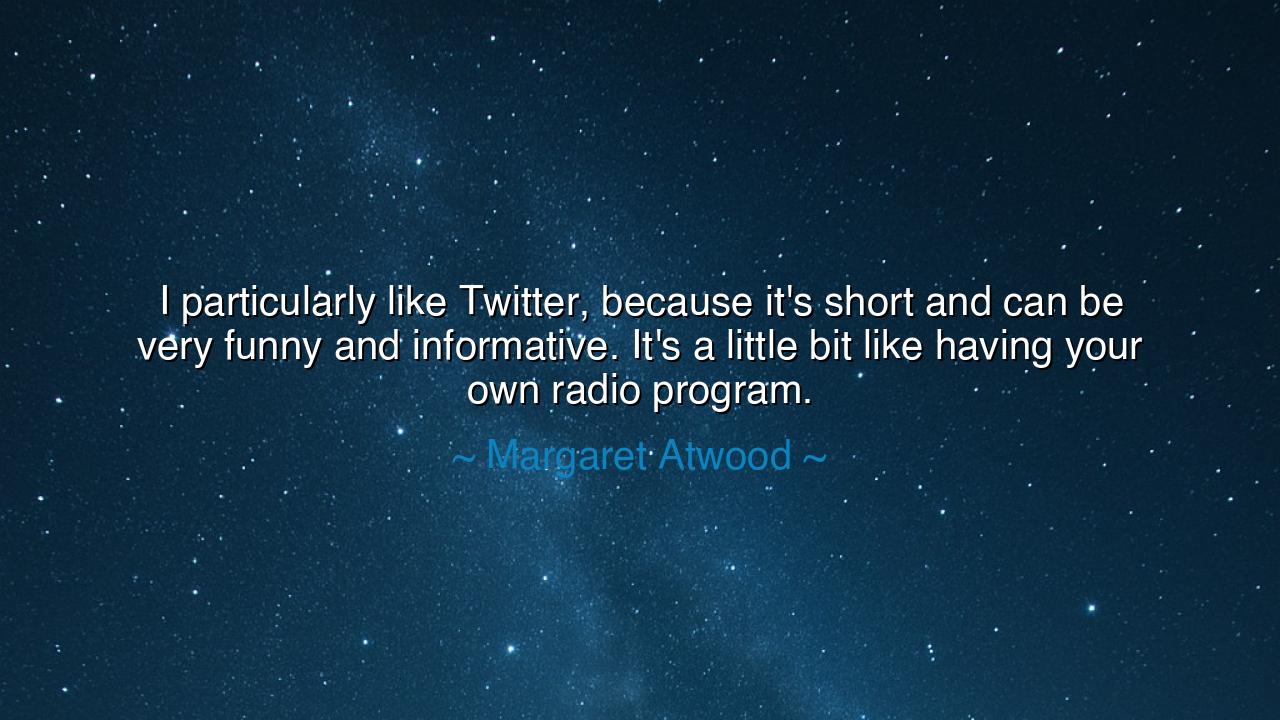
I particularly like Twitter, because it's short and can be very
I particularly like Twitter, because it's short and can be very funny and informative. It's a little bit like having your own radio program.






When Margaret Atwood said, “I particularly like Twitter, because it's short and can be very funny and informative. It's a little bit like having your own radio program,” she was not merely speaking about a modern tool of communication — she was reflecting on the ancient art of storytelling reborn in a new form. Her words carry the quiet wonder of a writer who has spent her life exploring how language connects souls across distance and time. In this quote, Atwood reveals that even in the fleeting realm of the digital age, the power of the word remains undiminished. For though the medium has changed — from parchment to print, from radio waves to screens — the impulse behind it remains the same: to speak, to be heard, to share truth and laughter with the world.
The origin of her words comes from her experience as both an observer and participant in the world of letters. Atwood, whose novels have shaped generations of thought, found in Twitter a reflection of something ancient yet new — the ability to speak to the multitudes with intimacy and immediacy. When she likens it to a radio program, she evokes the age when voices traveled invisibly through the air, binding people together across nations. The radio, like Twitter, carried humor, news, and human warmth. It gave the illusion of proximity between speaker and listener, just as social media gives us the illusion of closeness between strangers. Atwood’s delight in this parallel shows her enduring fascination with the ways that technology transforms, yet never destroys, the essence of human communication.
But her words are also a meditation on brevity — the art of saying much in little. She calls Twitter “short,” and in that shortness, she finds beauty. The ancients, too, understood the magic of the concise. The Stoic philosopher Epictetus once said, “Let silence be your general rule; or say only what is necessary, and in few words.” The power of the short form — whether an aphorism, a proverb, or a tweet — lies in its precision. A single line can carry the weight of an essay, if crafted with care. Atwood sees in this digital brevity not a loss of depth, but an opportunity: a challenge to distill wisdom, wit, and truth into their purest form. In her hands, even the modern tweet becomes a vessel for timeless art.
Yet, she also reminds us that communication need not always be solemn. She celebrates Twitter for being funny and informative, for humor and wisdom are not opposites but companions. The ancient playwright Aristophanes made Athens laugh even as he made it think, proving that comedy could be the sharpest weapon of insight. So too does Atwood recognize that humor, when used well, enlightens as it entertains. The power of Twitter, as she sees it, lies in this union — where laughter and learning meet, and truth can travel swiftly, dressed in the lightness of wit. In this way, she honors both the mind and the spirit, reminding us that even the briefest message can awaken thought or joy.
Atwood’s comparison to radio also reflects her understanding of intimacy in communication. When a writer speaks through a book, the connection is deep but distant. When one speaks through the air — or through a tweet — the connection is instant, almost conversational. The radio, like Twitter, allows the speaker to reach countless listeners, yet makes each one feel personally addressed. There is something profoundly human in this — the yearning to speak across silence, to feel that one’s voice matters, to find communion even among strangers. Through her words, Atwood acknowledges that every act of communication is, at its core, an act of hope.
And yet, as all wise teachers know, such power carries responsibility. The ancients understood that the spoken word could heal or harm, inspire or deceive. In the age of Twitter, where words move faster than thought, this truth is magnified. Atwood’s enjoyment of the medium is balanced by her discipline — she writes only what she finds “funny and informative,” what she deems worthy of her audience. The lesson is clear: speak with intention. Whether in writing or speech, the measure of wisdom is not how much we say, but how carefully we say it. The world already echoes with noise; what it needs are voices that bring clarity and kindness.
So, my children, take this teaching to heart. Use your words as instruments, not weapons. Let your speech be brief but bright, as Atwood’s is — filled with wit, but guided by thought. Whether you speak to one or to many, whether through parchment or pixels, remember that each word carries the weight of your spirit. Seek not to dominate the conversation, but to enrich it. Like the ancient orators and poets, find joy in crafting language that connects rather than divides. For every time you speak truthfully, thoughtfully, and with light in your heart, you too hold your own “radio program” — a signal of humanity, reaching out across the noise of the world.
Thus, Margaret Atwood reminds us that the tools may change, but the purpose of language endures: to bring minds together, to awaken laughter, and to remind us that, even in the brevity of a sentence, the eternal voice of the human spirit still sings.






AAdministratorAdministrator
Welcome, honored guests. Please leave a comment, we will respond soon